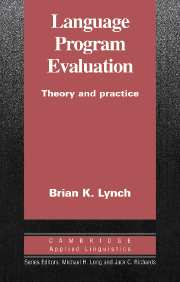Book contents
- Frontmatter
- Contents
- Series editors' preface
- Preface
- 1 Introduction
- 2 Historical background
- 3 Validity
- 4 Positivistic designs
- 5 Naturalistic designs
- 6 Quantitative data gathering and analysis
- 7 Qualitative data gathering and analysis
- 8 Combining positivistic and naturalistic program evaluation
- 9 Conclusions
- References
- Author index
- Subject index
2 - Historical background
Published online by Cambridge University Press: 05 October 2012
- Frontmatter
- Contents
- Series editors' preface
- Preface
- 1 Introduction
- 2 Historical background
- 3 Validity
- 4 Positivistic designs
- 5 Naturalistic designs
- 6 Quantitative data gathering and analysis
- 7 Qualitative data gathering and analysis
- 8 Combining positivistic and naturalistic program evaluation
- 9 Conclusions
- References
- Author index
- Subject index
Summary
In order to begin making judgments about how language education programs should be evaluated, it will be helpful to understand how they have been evaluated in the past. Because applied linguistics is itself a relatively young field, the literature on program evaluation within the field is quite scant. There is a body of documented evaluations that can be summarized, however, and this is the focus of the second part of this chapter.
I have defined applied linguistics as a discipline that applies knowledge from other disciplines to language-related issues, and program evaluation in our field has developed within a larger context of evaluation, especially as articulated in the education and psychology literature. Because of this, a historical account of program evaluation in applied linguistics will need to be set against the backdrop of an important “conversation” (Smith and Heshusius 1986) about how evaluation research should be conducted. As introduced in Chapter 1, this is the infamous quantitative–qualitative debate, which more recently has been referred to as the paradigm dialog (Guba 1990a) and is the focus of the following section.
The paradigm dialog
For some time now, there has been a major debate in education and psychology between advocates of positivistic, quantitative research methodology and advocates of naturalistic, qualitative research methodology. At the core of this debate is a discussion of the epistemological basis for research, which has had parallel discussions elsewhere in the social sciences (e.g., Habermas 1988).
- Type
- Chapter
- Information
- Language Program EvaluationTheory and Practice, pp. 12 - 40Publisher: Cambridge University PressPrint publication year: 1995
- 1
- Cited by

